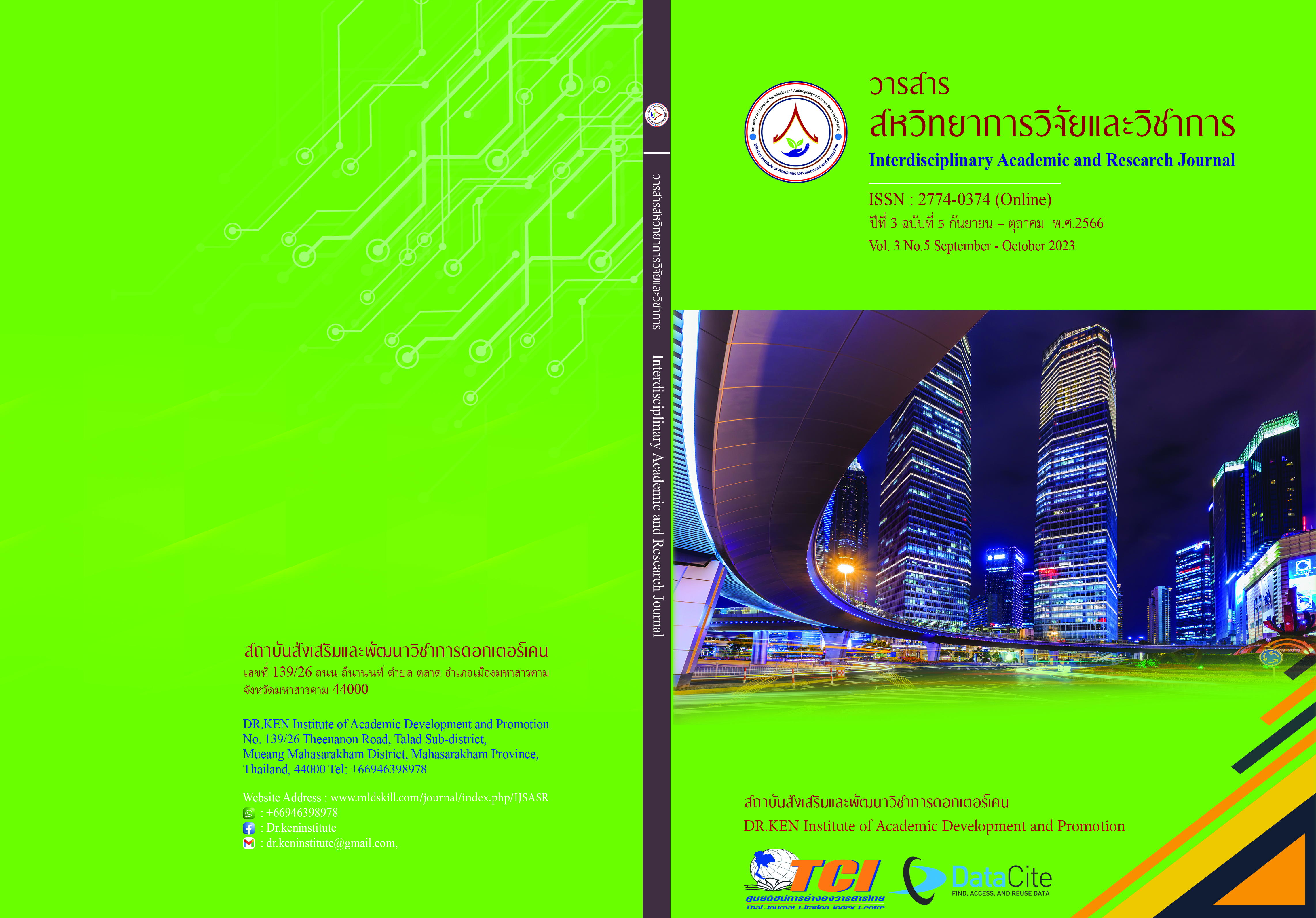Competency Analysis of Education Administrators in the Office of Secondary Educational Service Area in the Disruptive Era
DOI:
https://doi.org/10.14456/iarj.2023.261Keywords:
Educational Administrators Competency; , Disruption; , Education Management; , Secondary Education Service Area OfficeAbstract
Educational administrators who are very important in driving policy into practice, are at the heart of enhancing the quality of education for success. The Educational administrators must therefore be capable persons with higher operational competencies in line with expected academic status and must have the ability to develop learners. Thus, the objectives of this research were 1) to study the state of education management in the time of disruption era, and 2) to study and analyze the competencies of educational administrators under the Office of Secondary Education Service Areas in the time of disruption era. The tool used in this research is a semi-structured interview with predetermined and open-ended questions. Research informants are groups of people with specific qualifications in function, divided into 3 groups: competency experts, educational administration experts, and academic experts. There were 9 people in total. Content analysis is a method used to analyze data to explain the alignment between the competencies of educational administrators for educational management in times of disruption and the experiences of research participants. The results showed that educational management in this era requires a multifaceted approach that considers the changing roles of teachers, classrooms, students, assessment, and policy. Education administrators must have a broad vision to develop policies that encompass all dimensions of education: 1) the Dimension of mobility, 2) the Dimension of educational quality, 3) the Dimension of educational opportunities, and, 4) the Dimension of educational management. And the competencies of educational administrators affiliated with the Office of Secondary Educational Service Area in the era of transformation, resulting from this research, include 1) Technological competency, 2) Language competency, 3) Moral and ethical competency, 4) Problem-solving competency, 5) Good management competency, 6) Strategic and innovative thinking competency, 7) Change management competency, 8) Competency in synthesizing ideas, 9) Competency in inspiring others, 10) Competency in being able to move easily and quickly.
References
เกียรติอนันต์ ล้วนแก้ว. (2564). การศึกษาสร้างคนยุค Disruption เรียนรู้ - อยู่รอด - อยู่ให้ได้. Retrieved from: https://www.youtube.com/watch?v=CWAp04Gr90c
ชัยเสฏฐ์ พรหมศรี. (2557). ภาวะผู้นําร่วมสมัย. กรุงเทพฯ: ปัญญาชน.
ชูขวัญ รัตนพิทักษ์ธาดา ประทุมทอง ไตรรัตน์. (2566). สมรรถนะของผู้นำทางการศึกษาเพื่อการอยู่รอดและเติบโตในยุค BANI World. วารสารวิชาการสถาบันวิทยาการจัดการแห่งแปซิฟิค, 9 (1), 16-28.
นิฟิรดาวส์ นิ และชวลิต เกิดทิพย์ (2563). ทบทวนมุมมองการจัดการศึกษาอาชีวศึกษาในยุคสังคมพลิกผัน. วารสารวิชาการ มหาวิทยาลัยราชภัฏบุรีรัมย์. 12 (1), 111-126.
พิมพ์ประไพ ดวงบุบผา, เตือนใจ ดลประสิทธิ์. (2566). การบริหารการศึกษาในยุคดิจิทัลดิสรัปชัน. วิทยานิพนท์การศึกษามหาบัณฑิต สาชาวิชาการบริหารการศึกษา. มหาวิทยาลัยราชภัฏสวนสุนันทา.
มานะ ครุธาโรจน์, พิณสุดา สิริธรังศรี, สรรเสริญ สุวรรณ์. (2563). กลยุทธ์การพัฒนาสมรรถนะผู้บริหารสถานศึกษาขั้นพื้นฐาน ยุคการศึกษา 4.0. วารสารสังคมศาสตร์และมานุษยวิทยาเชิงพุทธ, 5 (9), 351-369.
รุ่งนภา มหาเกตุ. (2554). สมรรถนะผู้นำการเปลี่ยนแปลงที่ส่งผลต่อการบริหารตามกระบวนทัศน์ด้านการเรียนการสอนของผู้บริหารโรงเรียนมัธยมศึกษา จังหวัดปทุมธานี. ปริญญานิพนธ์ปริญญามหาบัณฑิต, มหาวิทยาลัยเทคโนโลยีราชมงคลธัญบุรี.
ศิรินนาถ ทับทิมใส,พร้อมพิไล บัวสุวรรณ และ วรรณวิศา สืบนุสรณ์ คล้ายจ าแลง. (2563). สมรรถนะของผู้บริหารสถานศึกษาในยุคการศึกษาที่พลิกผัน. น.28-39. การประชุมวิชาการระดับชาติ ครั้งที่ 8.วิทยาลัยนครราชสีมา.
ศิริยุพา รุ่งเริงสุข. (2561). HR วาไรตี้ คัมภีร์ บริหารคน. สถาบันบัณฑิตบริหารธุรกิจ ศศินทร์แห่งจุฬาลงกรณ์มหาวิทยาลัย. กรุงเทพฯ: โรงพิมพ์โพสต์ พับลิชชิง
สำนักงานข้าราชการพลเรือน. (2563). สมรรถนะสาหรับนักบริหารระดับสูงภาครัฐของไทยในศตวรรษที่ 21. สำนักงาน ก.พ., 62, 4. กรุงเทพฯ: สำนักงานข้าราชการพลเรือน.
สำนักงานคณะกรรมการข้าราชการครูและบุคลากรทางการศึกษา. (2564). หลักเกณฑ์และวิธีการประเมินตำแหน่งและวิทยฐานะข้าราชการครูและบุคลากรทางการศึกษา ตำแหน่งผู้บริหารการศึกษา. กรุงเทพฯ: สำนักงานคณะกรรมการข้าราชการครูและบุคลากรทางการศึกษา.
อัจฉรา สระวาสี ราชันย์ บุญธิมา สมชาย เทพแสง และ สมบูรณ์ บูรศิริรักษ์. (2559). การพัฒนารูปแบบสมรรถนะของผู้บริหารการศึกษา. วารสารสันติศึกษาปริทรรศน์, 4 (2), 217-231.
Aitken, E.J., (2015). Core Competencies for School Principal. The Education Review Office. Retrieved August 19, 2017, from Available from: http/www.ero.govt.nz/Publications.htm
Bapat, A., et al. (2015). A Leadership Competency Model: Describing the Capacity to Lead. Retrieved on 9 September 2017 from: http://www.safiyahsatterwhite.com/wp-content/upload/2014/11/Leadership OnlineModel.pdf
Taylor, F.W. (1911). The Principles of Scientific Management. New York: McMillan.
Hellriegel, D., Jackson, S.E., & Slocum, J. W. (2005). Management a Competency-Based Approach. New Delhi: Cengage Learning.
McClelland, D.C. (1973). Testing for competence rather than for Intelligence. American Psychologist. 28(1), 1-14.
Spencer, L.M. and Spencer, S.M. (1993). Competence at Work: Models for Superior Performance. John Wiley & Sons, New York.
Zwell. M. (2000). Creating a Culture of Competence. New York: John Wiley & Sons.
Downloads
Published
How to Cite
Issue
Section
License
Copyright (c) 2023 Unchalee Maithong, Theerapharp Phetmalaikul

This work is licensed under a Creative Commons Attribution-NonCommercial-NoDerivatives 4.0 International License.
Copyright on any article in the Interdisciplinary Academic and Research Journal is retained by the author(s) under the under the Creative Commons Attribution-NonCommercial-NoDerivatives 4.0 International License. Permission to use text, content, images, etc. of publication. Any user to read, download, copy, distribute, print, search, or link to the full texts of articles, crawl them for indexing, pass them as data to software, or use them for any other lawful purpose. But do not use it for commercial use or with the intent to benefit any business.
















.png)


